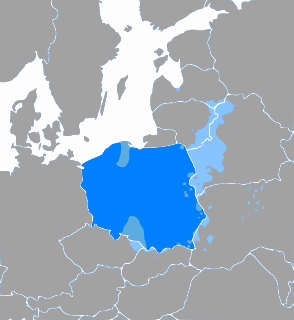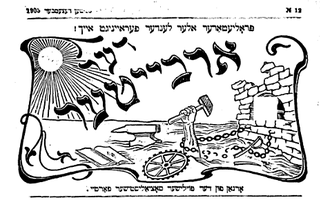Jewish Social Democratic Party Yidishe sotsial-demokratishe partey | |
|---|---|
| Founded | 1905 |
| Split from | Polish Social Democratic Party of Galicia |
| Ideology | Social democracy |
| Political position | Left-wing |
The Jewish Social Democratic Party (in Yiddish, Yidishe sotsial-demokratishe partey, Polish : Żydowska Partia Socjal-Demokratyczna, abbreviated ŻPS) was a political party in Galicia and later also Bukovina, established in a split from the Polish Social Democratic Party of Galicia (PPSD) in 1905. The party made its first public appearance on May 1, 1905, with separate May Day rallies in Kraków, Lemberg, Tarnów and Przemyśl. However, as the new party stressed that it was not a competitor of the existing Social Democratic parties, they later joined the PPSD celebrations. [1]
Yiddish is the historical language of the Ashkenazi Jews. It originated during the 9th century in Central Europe, providing the nascent Ashkenazi community with a High German-based vernacular fused with elements taken from Hebrew and Aramaic as well as from Slavic languages and traces of Romance languages. Yiddish is written with a fully vocalized version of the Hebrew alphabet.

Polish is a West Slavic language of the Lechitic group. It is spoken primarily in Poland and serves as the native language of the Poles. In addition to being an official language of Poland, it is also used by Polish minorities in other countries. There are over 50 million Polish language speakers around the world and it is one of the official languages of the European Union.
A political party is an organized group of people, often with common views, who come together to contest elections and hold power in the government. The party agrees on some proposed policies and programmes, with a view to promoting the collective good or furthering their supporters' interests.
Contents
The Party, often nicknamed the 'Galician Bund', was influenced by the Bund in Russia and was opposed to Zionism. [2]
ŻPS held its founding congress in June 1905. [1] The second congress was held in 1906. [2]
Its founding theoretician and secretary was Henryk Grossman. While the Party sought affiliation to the Social Democratic Workers Party of Austria, this was refused. The ŻPS became the largest organisation of Jewish workers in Galicia. [3]
Henryk Grossman was a Polish economist, historian, and Marxist revolutionary active in both Poland and Germany.
In the initial period of the existence of the party, it publish a monthtly titled Der yudisher sotsial-demokrat. In October 1905 it was replaced by a weekly, Der sotsial-demokrat. As of 1910, Der sotsial-demokrat had a circulation of 2000. [4]
In 1911 the Jewish Social Democracy in Galicia, the Jewish affiliate section of the PPSD, merged into the ŻPS. [2] The Jewish Social Democracy in Galicia had 377 members at the time of the merger. [4] The strength of the party reached its peak when the Bukovina Bundists merged into the party the following year. The united party took the name Jewish Social Democratic Party in Galicia and Bukovina. [2] [5]
In 1913, several prominent leaders of the erstwhile Jewish Social Democracy began returning to the PPSD. More devastating for the ŻPS, though, was the outbreak of the First World War. Galicia and Bukovina became battlefield, and party activities ceased. The branch in Cracow was reconstructed in 1916, and in the fall of 1917 there was a conference of delegates from different local ŻPS branches. On 15, 1918 Der sotsial-demokrat reappeared. [6]
In 1920, its organisation in Poland merged with the Polish Bund. [3] [7] [8] In Bukovina, now part of Romania, the remnants of the party continued to operate under the name 'Bund', and in 1922 they founded (along with Jewish socialists from Old Romania and Bessarabia) the General Jewish Labour Bund in Romania. [9]




